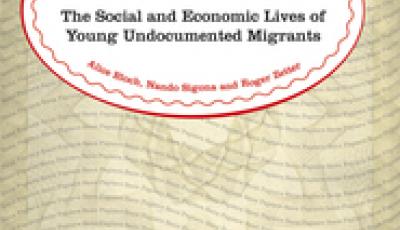Book Review: Sans Papiers: The Social and Economic Lives of Young Undocumented Migrants
Posted:
Time to read:
Post by Lea Sitkin, who has recently successfully defended her DPhil in Criminology at the University of Oxford and will be shortly taking up a Lectureship in Criminology at the University of Westminster. Follow Lea on Twitter @LeaMarikeSitkin.

The overriding impression is that the struggle for survival is a lonely one. Young adult undocumented immigrants learn quickly to rely on their own resources. While the book confirmed the importance of community networks in helping undocumented immigrants find work and housing in a foreign and hostile land, it also emphasised some of the problematic aspects of such dependence. For instance, some interviewees did not want to burden already over-stretched family and friends, while others did not have the social contacts to rely on in the first place. Still others were exploited by members of their own community.
The book also explores how the relationships between interviewees and members of the wider society are structured by the formers’ immigration status. Even those respondents who, with the benefit of false papers, found work in the legal labour market faced the everyday burden of keeping their story straight to colleagues. The ability to form intimate relationships with British citizens or legal immigrants was often complicated by suspicions that the undocumented person was merely after a visa or passport.
More generally, respondents avoided socialising with other young adults because of the risk of discovery by police and immigration authorities. Interviewees discussed the distance they felt from other, legally resident young adults, who could not identify with the challenges involved in sustaining oneself while being undocumented, and the guilt they felt for deceiving friends where they did not reveal their status. Irregular immigration status requires a constant calculation of where they can go, whom they could trust.
In order to combat their isolate, many of those interviewed in this book turned to the internet as a way of socialising, keeping in touch with friends and family from their home country through social networking sites. Here, the advantages of youthful fluency with technology are clear. Nonetheless, online contact could not compensate for the growing distance between them and friends and family back home, who were unable to identify with the challenges of life as an undocumented immigrant in the UK. The loss of contact with family at stage of development was a traumatic part of the experience of undocumented immigration for young adults.
In this context, it is unsurprising that the young women and men developed a strong sense of self-reliance. Indeed, for some, it was the sense of achievement in the face of considerable obstacles that made the process worthwhile. As Dymtro, one of the interview participants, put it, ‘those who come here and can survive in these [living] conditions will actually become a proper person in the future’ (p.146). Irregular immigration, in his view, a stepping stone to adult maturity.
For others, the value of migration was judged differently. Chinese respondents tended to concentrate on the amount of money earnt, while Kurds presented their immigration to the UK as a reaction to the situation they had left behind and in terms of the freedoms they had gained. Many, no matter what their nationality, found undocumented immigration became easier as they learnt the strategies to cope with it.
The book’s key strength lies in its descriptions and analysis of the agency of young adults who are undocumented in the UK. The respondents’ personal resilience and independence was inspiring. However, the overall picture was bleak. Despite their efforts, undocumented young adults in the UK are in a ‘time capsule’ that severely limits their ability to achieve long-term goals. Immigration controls shaped every part of their existence. Working in ethnic enclave businesses made it difficult to acquire the English language skills needed to have any chance of moving into better-quality employment. Many respondents felt they did not have the money nor the stability required for beginning a family (while those that had children in the UK worried about the impact of living irregularly on their children). Higher education was complex to access. Long-standing relationships were difficult to develop.
This is the importance of a book that focuses on young adulthood – a life stage that, for better or worse, is understood in the UK as one in which people shape their futures. It was the sense of long-term precarity – the inability to put down roots, the sense of ‘wasted lives’ - that was particularly saddening. As Welat, a 23 year old Kurdish man from Turkey said, ‘I am not in a position to dream’. It is in developing our understanding of the particular impact of immigration control for young adults that Sans Papiers is a vital contribution to the field.
Finally, the book also serves as an important reminder of the probable costs of intensifying the internal immigration control regime, as is occurring under the Immigration Act 2014. While the stated aim of the legislation is to deter immigration, it does not necessarily follow that increasing the internal control regime will either deter future migrants - or encourage those without status to leave the country. Many will stay, either because of the situation in their home land, or because of ties and opportunities they have forged here. For this group, the fight for survival will become ever more difficult – and the ability to dream, ever more out of reach. Sans Papiers offers a powerful reminder of the human costs of immigration control
Share:








